News & Media
Sifiso Ndlovu on the Mbeki he knows
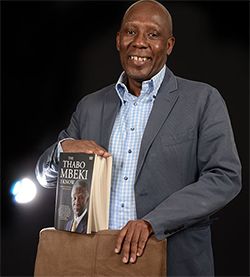
Prof Sifiso Mxolisi Ndlovu (Department of Interdisciplinary Studies at Unisa) co-edited The Mbeki I know, which he defines as four years of hard labour. He is no stranger to the Thabo Mbeki Foundation where he was the editor-in-chief of The Road to Democracy in South Africa multi-volume series published by Unisa Press under the auspices of the South African Democracy Education Trust.
Unisa’s very own Prof Sifiso Mxolisi Ndlovu has played a key role in the book The Thabo Mbeki I know, which is a collection that celebrates one of South Africa’s most exceptional thought leaders. Edited by Ndlovu and Miranda Strydom, who worked closely with Mbeki during her days as presidential correspondent at the SABC and later at the Thabo Mbeki Foundation (TMF), the book provides readers with an opportunity to reassess Mbeki’s contribution to post-apartheid South Africa as both deputy president and president, to the African continent and diaspora as a highly respected state leader, and to the international community as a whole.
Ndlovu, from Unisa’s Department of Interdisciplinary Studies, is no stranger to the TMF, where he is the editor-in-chief of The Road to Democracy in South Africa multi-volume series published by Unisa Press under the auspices of the South African Democracy Education Trust (SADET).
The relationship between SADET and Unisa Press dates back to 2004 and this experience helped with Ndlovu being one of the co-editors of The Thabo Mbeki I know book project. The TMF board recognised the fact that together with Strydom, he was qualified to co-edit the book. “In fact, we value the independence bestowed upon us by the board and also by Max Boqwana, CEO of TMF. They only saw the final copy of the book when it was published and launched this year. This also includes the former president himself—they were not privy to the content,” explained Ndlovu.
Four years of hard labour
This project began in 2012 and Strydom was the sole editor until Ndlovu formally joined TMF in 2013. “So the book is defined by four years of hard labour,” said Ndlovu.
For him, the process of a book of this nature was similar to the research methodology that was adopted in publications such as the Road to Democracy in South Africa and also South Africans telling their stories, which is another SADET publication. “It was more or less both an intellectual and academic process. For example, one of the research methodologies we adopted focuses on recording and collecting oral history testimonies which are narrated by people from various walks of life across the race and class divide. This inclusive approach defines the content of The Thabo Mbeki I know.”
As an example, they recorded and published oral history interviews with President Olusegun Obasanjo of Nigeria and President Keitumile Masire of Botswana, Tau Thekiso who was a bodyguard and driver in charge of security, and Mpho Ngozi who worked in the office of President Mbeki and was responsible for, among other things, the diary of the President of the Republic of South Africa. This eclectic approach allows them to capture what historians refer to as ‘history from above’ and also ‘history from below’. The implications are that it is not only oral history testimonies and memories of powerful statesmen such as Obasanjo and Masire that count, but also the memories and narrative articulated by the common people represented by Ngozi and Thekiso. “This was one of the empowering processes that informed our approach and all the oral history testimonies which were recorded by myself and Miranda. It was really a humbling experience,” he said.
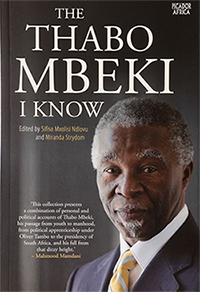
The Thabo Mbeki I know is a collection that celebrates one of South Africa’s most exceptional thought leaders.
Entire book is stimulating
So does Ndlovu have a favourite part in the book? The answer is an emphatic no. “The entire book is stimulating and therefore I do not have a favourite part; no wonder it was sold out within a week after it was published,” he said with pride. Furthermore, the book has been reprinted three times within the two months after it was published. It has been one of the best-selling books in South Africa ever since. “I would like to believe that this is because the book covers a variety of themes and content relevant to students of politics, history, sociology, economics (political economy), diplomacy, international relations, peace studies, and ICT, as the contribution by Andile Ngcaba highlights,” explained Ndlovu.
Through the book, Ndlovu pointed out that it has becomes obvious that Mbeki was not solely responsible for making a multi-faceted history. “He was part of a committed, progressive collective and therefore this book is definitely not a ‘de-facto autobiography’ as some critics would like us to be believe. This is why we adopted the life-history approach when we recorded and collected the oral history interviews. It was about signifying the crucial role played by each member of the collective responsible for our freedom and emancipation in 1994.”
As the author of The Soweto Uprisings: Counter-memories of June 1976 and given the 40th anniversary this year, Ndlovu certainly has his thoughts on the democratic strides South Africa has made or if we are indeed regressing. He is fascinated by both Welile Nhlapho and Dr Essop Pahad’s narratives, which were essentially about the centrality and importance of progressive youth and student movements in playing a pro-active role in liberation history and politics. “So in a sense as long as the youth and students abdicate their duties in this regard, I would be tempted to argue that we are regressing. However if the youth and students, through progressive movements, are not docile politically speaking, I would argue that we are not regressing because it would take us more than 24 years to undo the damage inflicted upon us by white oppressors. Together with the youth and student movement, we should strive to give power back to the people in order for us to make meaningful strides in terms of nation building,” he said.
Publish date: 2016-09-22 00:00:00.0


 AI specialist to kick off Unisa’s Research and Innovation Week
AI specialist to kick off Unisa’s Research and Innovation Week
 How Medical Ethics and Health in Islam became a master’s journey for Rabia Mahomed
How Medical Ethics and Health in Islam became a master’s journey for Rabia Mahomed
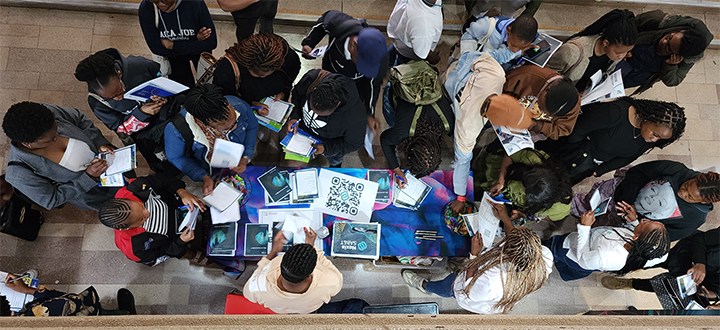 Employment boost for Unisa’s accounting students
Employment boost for Unisa’s accounting students
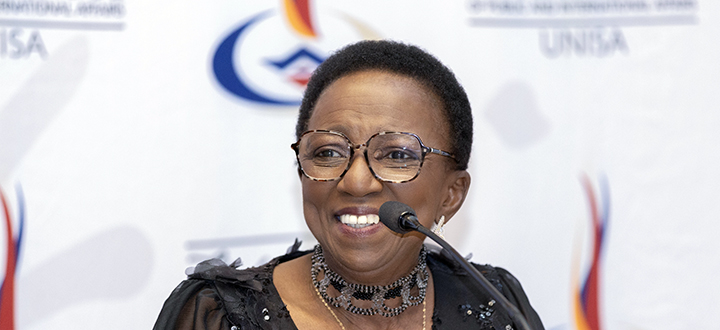 Life and legacy of Miriam Makeba celebrated at Unisa
Life and legacy of Miriam Makeba celebrated at Unisa
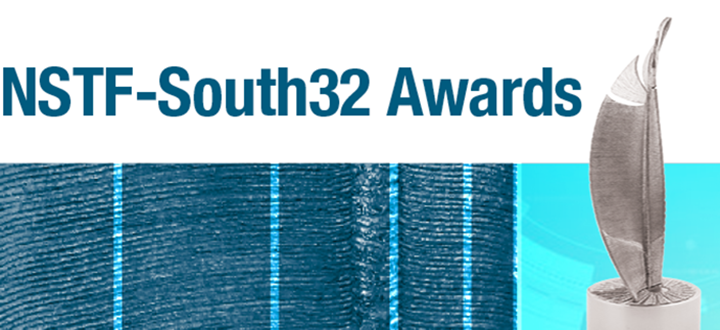 Unisa nominees gear up for the Science Oscars
Unisa nominees gear up for the Science Oscars